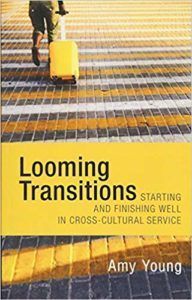
Book review: 'Looming Transitions' prepares cross-cultural workers to navigate change
By Gary Ridley, Sr., SEND U — Transitions are common in a missionary’s life. My wife and I have been missionaries for 41 years and are now in the middle of our ninth Home Service.
Saying that transitions are common does not mean they are not difficult or disruptive. Though it can be tough to imagine as you’re going through them, there is light beyond the transition — and resources like Amy Young’s “Looming Transitions: Starting and Finishing Well in Cross-Cultural Service” can help.
Young writes this easy, conversational book based on her own 20-year experience serving in Asia where she helped hundreds of people adjust to the field and prepare to leave it.
The introduction and first two chapters give a clear and honest picture of what transitions look like. Young points out that the stress of transitions stems from the gap between our expectations and the reality along the way. Transitions affect us socially, physically, and emotionally.

Chapter 3, “Stay Grounded in Christ,” points to the importance of one’s relationship with Christ to provide stability through transitions. Young writes, “Part of finishing well is to stay grounded in something that will outlive this transition. Staying rooted in Christ while being uprooted in this chapter of your story is going to be a daily reorienting point in the story you tell.”
Chapter 4 tackles an unexpected aspect of transition — “Laughter Revives the Soul.” Chapter 5, “Accept That It’s Going to Be Messy,” reminds us that chaos can show up in relationships, housing and possessions, finances, and even the weather.
“Know Yourself,” chapter 6, looks at time management, thoroughness of task completion, grieving style, and identity.
While the book has included a lot of practical advice up to this point, there is a definite shift at the end toward detailed, practical steps. Chapter 7, “Start Early,” advises making a plan that will provide some structure in the midst of the messiness of transitions. “Make a list of everything you need to do and want to see happen in the upcoming months. Next we will transform your list into a plan. Start by dividing your list according to the following four categories: (1) paperwork, (2) personal belongings, (3) people, and (4) places and experiences.”
Our transitions affect many people around us, and we need to reach out to help them process as well — the subject of chapter 8.
“Work Out Your Grief,” chapter 9, gives practical steps for dealing with the sorrow that will be part of every transition.
The final chapter of the book focuses on “Your Unique Path.” Transitions are not resolved with a cookie cutter. This chapter includes discussions for many of the transitions a cross-cultural worker might make over the course of her career:
- First time to the field
- First furlough or home assignment
- Returning to the field after a furlough or home assignment
- Subsequent furloughs and home assignments
- Leaving the field for the foreseeable future
Each of these discussions concludes with a list of five questions to consider in planning for the transition. There are additionally five questions for high school graduates returning to their passport country to start college as well as five for their parents. All these questions are both practical and insightful.
The book does not discuss about retirement as a transition, probably because that requires a book of its own!
Transitions are an unavoidable part of missionary lives that can be navigated more successfully by making use of “Looming Transitions.” The book doesn’t replace your role as the person who has to navigate the transition, but it gives you the charts, prevailing winds and currents, asking important questions so that you can make wise decisions as you sail through changes. I recommend reading it before your next transition.
If you choose to buy “Looming Transitions,” consider using https://smile.amazon.com
and choosing to donate a portion of the purchase price to SEND International
, at no additional cost to you. Thank you!
Additional Posts





